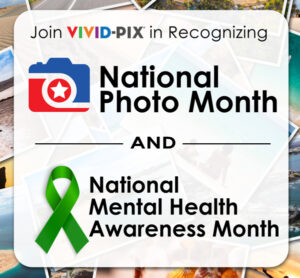Your cart is currently empty!
Vivid-Pix Recognizes May’s National Photo Month & Mental Health Awareness Month

Savannah, GA, May 1, 2023 – Vivid-Pix, www.vivid-pix.com, is recognizing National Photography Month and National Mental Health Month in May by showcasing the joy and healing power of photos.
According to the National Institutes of Health, “Reminiscence Therapy (RT) involves the discussion of past activities, events and experiences with another person or group of people, usually with the aid of tangible prompts, such as photographs, household and other familiar items from the past, music, and archive sound recordings.”
Vivid-Pix is hosting classes, specials and giveaways throughout the month. Class topics include photo organization, photo restoration, storytelling, genealogy and photo reminiscence therapy: https://www.facebook.com/vividpixfix/. Relive Your Memories giveaway details can be found at: https://staging.vivid-pix.com/giveaway/. Family history enthusiasts will enjoy the mystery game What Happened to Great Uncle George? https://staging.vivid-pix.com/unclegeorge/.
Value of Pictures to Reduce Stress
Ever look at a photo prompting a memory and a smile to flash across your mind and face? It’s a physiological reaction. When looking at photos, cortisol levels are lowered, and this reduces stress. According to WebMD, the hormone cortisol manages the body’s stress levels. If you’re constantly under stress, cortisol can derail your body’s most important functions, leading to health problems, including anxiety and depression. With the psychological impact of social distancing, missing holidays with loved ones, isolation, fear of sickness, and financial issues from closures, reminiscing about cherished memories is more important than ever.
Experts Use Photography Reminiscence Therapy to Help Depression, Dementia, & Alzheimer’s
Experts have been using Reminiscence Therapy for years to help depression, dementia, and Alzheimer’s. As reported by NPR, “Researchers find that dementia patients who engage in activities such as gathering photographs and talking about family see improvements in their quality of life and are less agitated,” said Shirley Wang, NPR.
Vivid-Pix, CERTUS Institute, achi, and the National Institute for Dementia Education research provides insight into how different types of photos affect those with memory loss and their benefit with important daily tasks such as taking medicine and interacting with others.
Europe-based Researchgate reported that Reminiscence Therapy is an effective way to increase self-esteem and decrease behavioral disturbances in those with dementia, and their research proved that photography was the best therapy. “Eighty percent of the subjects (12 out of 15) showed more attention to their personalised reminiscence photo video than to the other two types of TV shows, thus suggesting the effectiveness of personalised reminiscence photo videos for reminiscence intervention.”
Taking a daily photo also improved well-being through self-care, community interaction, and the potential for reminiscence. According to ScienceDaily.com, U.K. researchers said it’s “an active process of meaning making, in which a new conceptualisation of wellbeing emerges.” “[If] I’m ever feeling down or something, it’s nice to be able to scroll back and see good memories. You know, the photos I’ve taken will have a positive memory attached to it even if it’s something as simple as I had a really lovely half an hour for lunch sitting outside and was feeling really relaxed,” said a study participant.
About Vivid-Pix
Vivid-Pix helps individuals, families, friends and organizations with their most treasured memories by inventing and harnessing technologies. Vivid-Pix Solutions assists family historians, as well as paid and unpaid caregivers, to assist with cognitive decline and dementia through Photo Reminiscence Therapy. Vivid-Pix patented software has been sold in over 120 countries, improving photos and documents.
Media contacts
Name: Rick Voight, CEO Vivid-Pix
Phone: 404-664-9897
Email: rick.voight@vivid-pix.com
Website: www.vivid-pix.com
